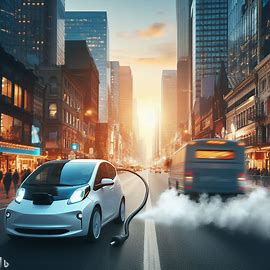The automotive industry is in the midst of a transformative revolution, and at the heart of this revolution are Electric Vehicles (EVs), challenging the long-standing dominance of petrol-powered cars. With environmental concerns, fluctuating fuel prices, and technological advancements in the spotlight, the question that arises is whether an EV car is better than a petrol car. This debate transcends mere personal preference, delving into factors like sustainability, cost-efficiency, performance, and the overall driving experience. In this comprehensive exploration, we’ll dissect the arguments on both sides of the aisle, shedding light on the key considerations that can help you make an informed decision about the future of your car ownership.
Key Takeaways
- Exterior appearance alone cannot determine if a car is electric or petrol.
- Electric cars have unique design features to indicate their eco-friendly nature.
- Electric cars operate silently due to the absence of combustion engines.
- Electric cars generally have a higher upfront cost compared to petrol cars.
Environmental Impact
You should consider the environmental impact of both electric cars and petrol cars before making a decision.
Electric cars are considered more environmentally friendly than petrol cars due to their zero carbon emissions. They don’t contribute to air pollution or greenhouse gas emissions, making them a cleaner option for the environment.
On the other hand, petrol cars emit carbon dioxide and other pollutants that are harmful to the environment. The combustion of petrol releases harmful gases into the atmosphere, contributing to climate change and air pollution.
Performance and Acceleration
If you’re looking for a car with impressive performance and quick acceleration, an electric car’s instant torque and smooth acceleration might be the right choice for you.
Electric cars are powered by an electric powertrain, which consists of a battery pack and an electric motor. Unlike petrol cars that rely on internal combustion engines, electric cars operate silently and deliver instant power to the wheels.
This means that you can experience thrilling acceleration and responsive handling. The instant torque of an electric car allows for quick overtakes and a seamless driving experience.
Additionally, electric cars have fewer mechanical parts compared to petrol cars, resulting in lower maintenance requirements.

Cost of Ownership
Electric cars generally have a higher upfront cost, but when you take into account factors like registration charges, insurance, and maintenance, their overall cost of ownership can be more affordable in the long run.
While the initial price may be higher, electric cars have lower operational costs due to the cheaper price of electricity compared to petrol. Additionally, electric cars require less maintenance as they’ve fewer mechanical components that can wear out or break. This means you’ll spend less on repairs and replacements over time.
Moreover, electric cars often qualify for incentives and tax credits, further reducing their overall cost. So, even though you might pay more upfront, the savings in the long term make electric cars a more affordable option for many individuals.
Driving Range and Charging Infrastructure
The driving range of electric cars has significantly improved, and with the expansion of charging infrastructure, owning an EV has become more convenient.
You can now travel longer distances on a single charge, reducing the need for frequent stops to recharge. This improvement in range has made electric cars a viable option for everyday use, including longer trips.
Additionally, the expansion of charging infrastructure means that you have more options for recharging your EV. Charging stations are becoming more widespread, making it easier to find a place to charge your vehicle when needed.
With these advancements, the concerns about range anxiety and limited charging options are being alleviated, making electric cars a more practical and convenient choice for many drivers.
Maintenance and Repair
You should consider the cost and frequency of maintenance and repair when deciding between an electric car and a petrol car.
Electric cars generally have lower maintenance requirements compared to petrol cars. They’ve fewer mechanical components, resulting in fewer potential issues and less frequent visits to the mechanic. Additionally, electric cars don’t require oil changes or tune-ups like petrol cars do.
However, it’s important to note that electric car maintenance can be expensive when it comes to battery pack replacements. These replacements can cost a significant amount of money.
On the other hand, petrol cars may require more frequent maintenance, such as oil changes and engine tune-ups. This can add up over time and increase the overall cost of ownership.
Variety and Options
When considering your options, it’s important to note the wide variety of choices available in the market for both electric and petrol cars.
Electric cars offer a range of models from different manufacturers, each with their own unique features and specifications. From sleek sedans to spacious SUVs, there’s an electric car to suit every lifestyle and preference.
On the other hand, petrol cars also provide a diverse selection, with various brands, models, and sizes to choose from. Whether you prefer a compact hatchback or a powerful sports car, the petrol car market has something for everyone.
Resale Value
Considering the limited resale value of petrol cars compared to electric cars, it’s important to factor in the potential financial implications when making your decision. While petrol cars may offer a wide variety of options and a thrilling driving experience, their resale value tends to depreciate faster.
On the other hand, electric cars have a higher upfront cost but hold their value better over time. This means that when it comes time to sell or trade in your vehicle, you may recoup a larger portion of your initial investment with an electric car. This can be an important consideration when assessing the long-term costs and benefits of owning a vehicle.
Personal Preference and Needs
Your personal preference and needs will ultimately dictate whether an electric car or a petrol car is the best choice for you.
Electric cars offer the advantage of being eco-friendly, with zero carbon emissions and lower running costs due to cheaper electricity compared to petrol. They also provide a quiet and smooth driving experience with instant torque and low maintenance requirements. However, electric cars have limitations such as a limited driving range and longer charging times.
On the other hand, petrol cars offer a wide range of options, better acceleration, and a longer lifespan for the internal combustion engine. They also have a vast network of service centers and quicker refueling times. However, petrol cars have higher fuel consumption, emissions, and running costs.
Consider your daily commute, charging infrastructure, and performance preferences to make the best decision for your transportation needs.
Conclusion
After considering the advantages and disadvantages of electric cars and petrol cars, it’s clear that the future is leaning towards electric vehicles. With their lower environmental impact, impressive performance, and potential for long-term cost savings, electric cars are a better choice for those who prioritize sustainability and efficiency.
By choosing an electric car, you can contribute to a greener future and enjoy a thrilling driving experience. So, why not join the electric revolution and make a positive impact on the world?
